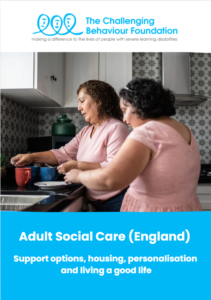Adult Social Care (England): Support options, housing, personalisation and living a good life
We hope this guide will help families to access and navigate social care for their relative. It is divided into different sections that cover:
- Your relative’s rights: This section talks about the basic rights people with learning disabilities have, and how families can make sure those rights are respected.
- Assessing needs and care planning: Here, you learn how to plan for your relative’s care, including thinking ahead for their needs, making decisions together, and involving them as much as possible.
- Choices: This part explains the different choices you and your relative have, such as where they might live, what kind of support they can get, and how to choose the best help.
- Getting funding: This section talks about how your relative’s care and support will be paid for, including how the local authority should work out how much your relative contributes towards their care costs and how disability related expenses allowance may reduce this amount.
- What to do if things change: If your relative’s situation changes, this section explains what steps you should take—like asking for a review or changing their support plan.
- Dealing with problems: This part gives advice on what to do if you have problems with your relative’s care, support, or services. It includes tips for solving issues and people you can contact for help.
- Keeping your relative safe: Trusting others to care for your relative can be worrying, so this section explains the regulations that are in place to keep them safe and lists ways you can help keep your relative such as involving an advocate.
- Finding help: Here, you’ll find information about different groups and organisations you can turn to for more support or information.
- Questions you can ask support providers: At the end of the guide, there is a list of questions you can ask support providers to make sure your relative is getting good care and a checklist to help you think about the plans your relative needs to have in place.
Remember: It’s never too soon to start – and it’s never too late to change for the better!

Download: Adult Social Care – England

